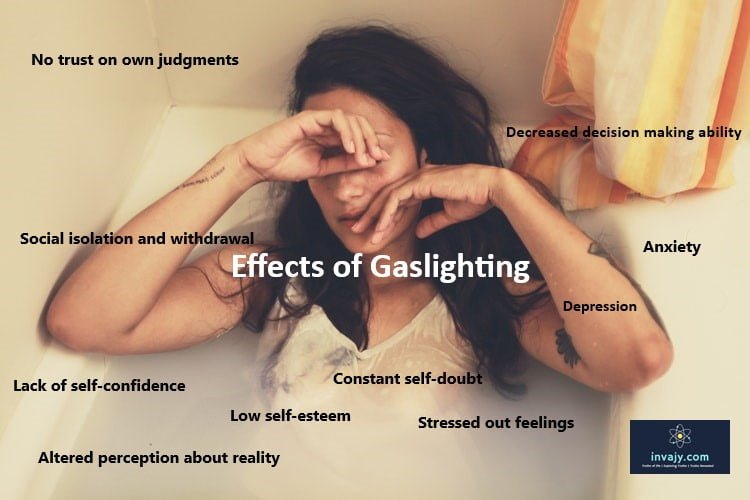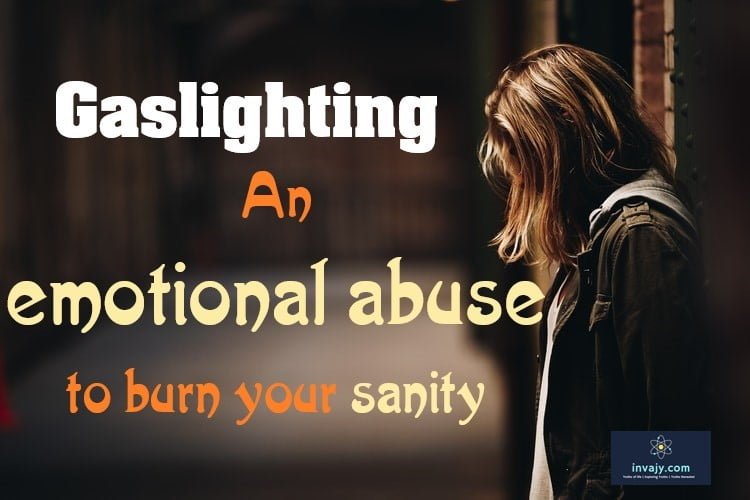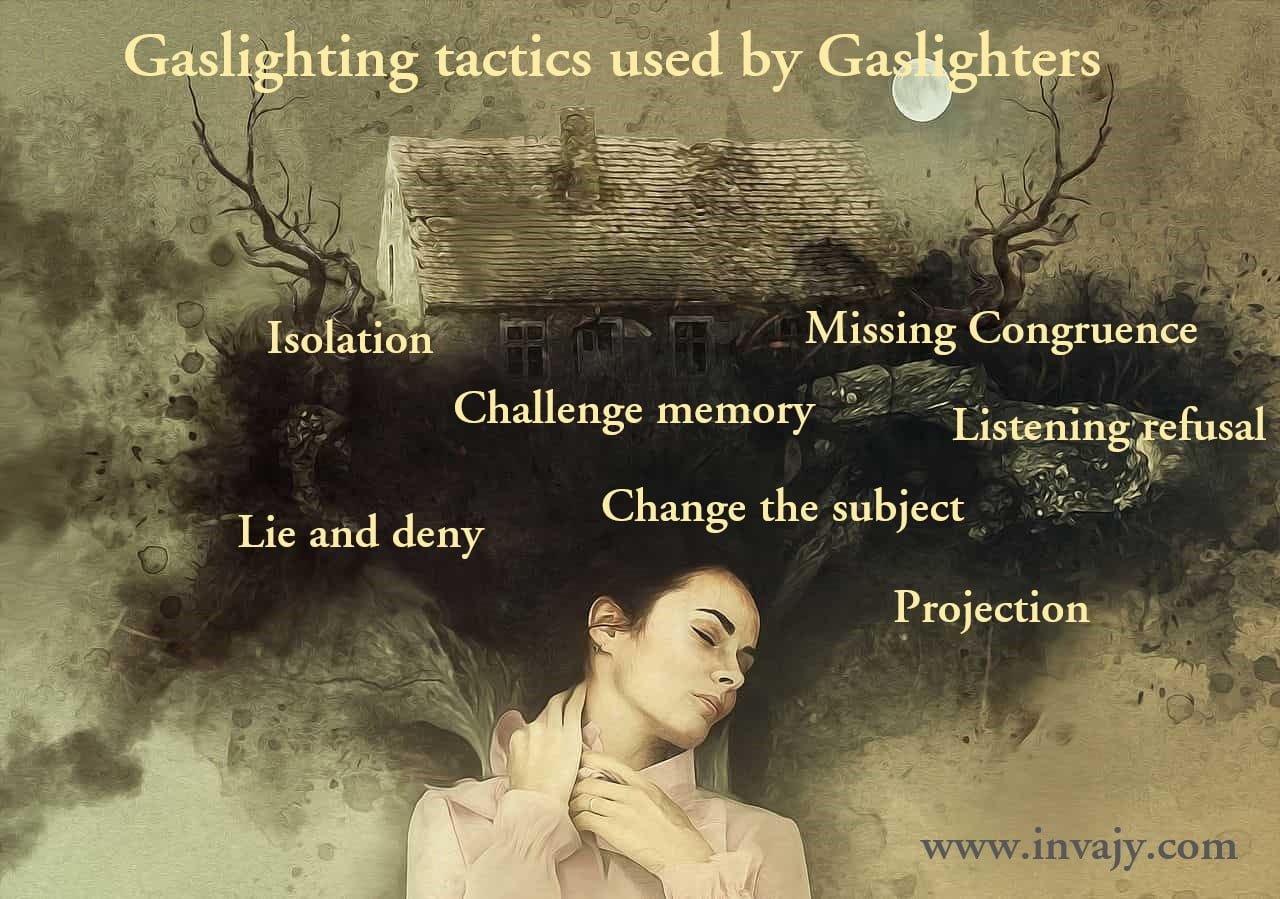Gaslighting or Gaslighters …. this term is being used more than ever before in clinical and research literature as well as in political commentary. The term Gaslighting is now commonly used to describe behavior that is inherently manipulative. Gaslighting is a powerful form of emotional abuse. This sophisticated emotional abuse tactic makes victims question their own sanity.
Gaslighters use this mind game to gain control over the victim. Like other types of abuse, gaslighting can turn out in all sorts of relationships, including personal, romantic, social and professional. You may find gaslighters everywhere; political leaders, social media influencer, news anchors, celebrities, your neighbor, a close friend, your boss, colleague, your sibling, parents or other close relations – anyone of among these people surrounding you is in the position to gaslight you
What is gaslighting?
Gaslighting is a form of psychological and emotional abuse used to eradicate or alter another human being’s perception of reality to gain influence, power, and control. Gaslighters deliberately play subtle mind games and psychological manipulations; which are carried out gradually in stages. To undermine the mental stability of its victim gaslighter repeats such manipulation time after time. These cause another individual (victim) to doubt his/her own judgments and perceptions.
The origin of the term Gaslighting
I know a question must be bugging you; from where did this term come from? The trendy phrase “Gaslighting” is originated from a 1938 mystery thriller play written by British playwright Patrick Hamilton called Gaslight . It was adapted into a popular movie in 1944 ; starring Ingrid Bergman and Charles Boyer and directed by George Cukor. In the movie, husband Gregory manipulates his innocent, loving and trusting wife Paula into believing she can no longer believe her own perceptions of reality.
Gregory tries to convince Paula through manipulating situations that she is going crazy. In one pivotal scene of this popular movie, Gregory causes the gaslights in the house to flicker by turning them on in the attic of the house. Paula notices this change asks his husband why the gaslights are flickering. Gregory convinces Paula that it’s not really happening and that it’s all in her mind, causing her to doubt her self-perception. Hence the term Gaslighting was born.
While the term Gaslighting never vanished, over seven decades later, gaslighting has fully resurfaced in personal relationships. The word gaslighting has become more popular everywhere since Donald Trump’s inauguration, so much so that the Oxford Dictionaries included it in one of the most popular words of 2018.
Effects of gaslighting
Galighting can have catastrophic effects on your mental health. The process is often gradual and may lead a person to develop mental health concerns. Gaslighting can impact your life in following manner
- Constant self-doubt
- Altered perception about reality
- No trust on own judgments
- Stressed out feelings
- Lack of self-confidence
- Low self-esteem
- Anxiety
- Social isolation and withdrawal
- Decreased decision making ability
- Depression

Gaslighting tactics used by Gaslighters
Gaslighting can take place in various forms. Sometimes; it involves manipulating a person’s environment behind her/his back. On some other occasions the form of psychological abuse is entirely verbal and emotional. Common techniques used by gaslighters include following manipulative actions. These are most common warning signs of gaslighting
Lie and deny
A gaslighter is a constant liar. Gaslighters lie, lie and lie. Lie and deny these are the biggest weapons of gaslighters. They set up abusive pattern using them. The target/victim begins to question everything and become uncertain of the simplest matters. This self doubt and confusion in victim’s mind is what all gaslighters want. The constant self doubt and confusion that the abuser has instilled leads the victim to become desperate for clarity. In most of the cases the victim tries to seek clarity from abuser only. It becomes cycle and victim become more vulnerable.
Projection
Projection is gaslighter’s signature technique. They are liar, cheater, manipulator and have negative mindset. Whatever the gaslighter/narcissist is or whatever he/she is doing, he/she will assign those characteristics or behaviors to you. Gaslighters uses this technique projection so often that target/victim starts trying to defend him/her; and is distracted from the gaslighter’s own behavior.

Congruence
The congruence is missing in what gaslighters say and what they do. One can notice the mismatch in their words and actions. They will make promises and commitments but their words mean nothing. When it comes to action, their behavior is altogether different. They will also use compassionate words as a weapon at times to smooth over the particular situation. Then questioned for any incident, they may use words like, ” Honey, you know how much I love you. I can’t even think to hurt you like this.” These are the apologies and words which victim want to hear, but those are not authentic. When dealing with gaslighters always pay attention to their actions and not on the words.
Listening refusal
The gaslighters refuse to listen any concerns of gaslightee or pretend not to understand them. They try to make the victim feel bitter and question own sanity.
Challenge memory
They challenge and question the victim’s memory. Gaslighters deny the incidents and events occurred in the way the gaslithtee remembers. They may even deny and pretend to forget incidents or events that have happened actually, this manipulation helps further question the victim’s memory. They may also create false details of the incident or event that did not occur.

Change the subject
Gaslighters change the subject and try to divert the target’s attention from a topic. They divert the topic by asking another question, or making a statement typically directed to challenge your thoughts. They may also twist and redirect the conversation into an argument about the person’s credibility.
Isolation
Gasligter declare that you are crazy. They know that victim is questioning his/her sanity. As I mentioned earlier, unfortunately in most of cases the victim search for clarity in the person who is purposefully causing the confusion. Here they call victim crazy and make them to believe it. They also spread it to other people, relatives and friends that “you’re crazy”. Gaslighter spreads rumors and gossips about you to relatives, friends and other surrounding people to you. They will pretend to be worried about you and “your behavior” while subtly telling others that you seems to have mental health issues like emotionally unstable or crazy. When victim approach them (friends and relatives) for help, they does not believe him/her. They don’t take the victim seriously. This way gaslighter isolates the victim from getting help.

Signs of Gaslighting
I have already mentioned the harmful and bad effects of gaslighting on receiver or victim. Long exposure to gaslighting triggers many mental health issues. Therefore, it becomes extremely important to recognize when you are being gaslighted. Check the following signs of gaslighting and ask yourself if any of the symptom or statements is true for your life:
- You start doubting your own feelings or your sense of reality, and try to convince yourself that the gaslighter’s behaviour is not that bad or that you are being too sensitive on the issues.
- Decision making becomes tough and you distrust yourself. You look towards your friends, partner or relatives for taking decisions for you.
- There is no congruence in words and actions of your spouse, family member or friends. Their behaviour confuses you.
- You feel like you are having low self-esteem. The thoughts like you are not “good enough” always prevails in your mind.
- You always keep apologizing for what you do or who you are, assuming people are disappointed with you.
- You try to live up to the ingenuine, unrealistic and unreasonable expectations and demands of others.
- Sense of insecurity and vulnerability, you feel like your behavior and actions will be questioned and you will look like fool in front of others.
- You feel like something worst or terrible is about to happen whenever friends, spouse or relatives surrounds you.
- A strong feeling that you are good for nothing.
- You feel lonely, powerless and trapped.
The more you are aware of these gaslighting techniques, the earlier you can identify them and avoid falling into the gaslighter’s trap. Are you experiencing gaslighting? Do you know someone else who is? Do you have any recommendations that would help others? Please feel free to share in the comment section.

